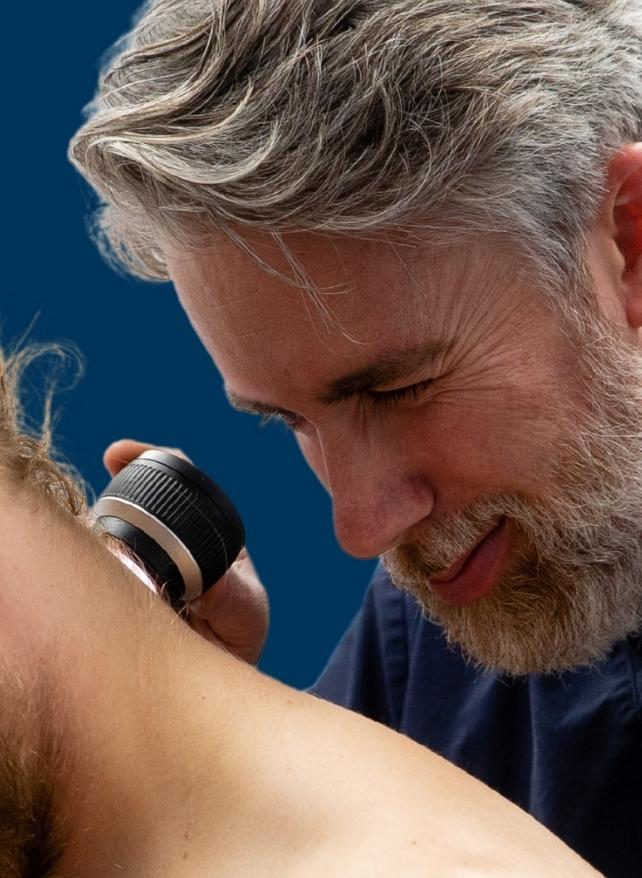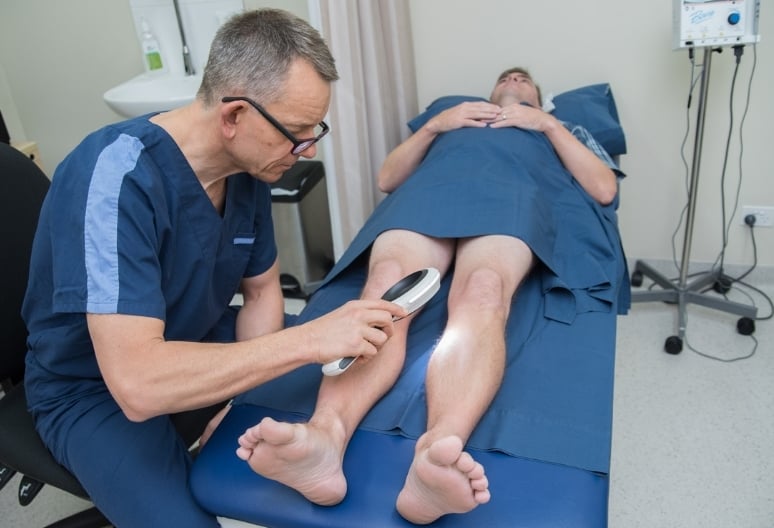welcome to
National Skin Cancer Centres
Doctors at National Skin Cancer Centres work primarily in skin cancer diagnosis and treatment as well as the management of medical and cosmetic skin conditions and thus provide a comprehensive approach to looking after your skin health.
Following our vision of a world where nobody dies of skin cancer, our medical team deliver the highest standard of care and save lives every day. They will provide you with expert advice, utmost skill - and most importantly, peace of mind. They will help you with skin cancer examinations, total body photography, surgical and non-surgical skin cancer treatments, wound and scar management.
Our medical team approach skin repair and cosmetic treatments with the same level of respect and credibility as skin cancer medicine. Providing solutions to patients who wish to restore a healthy and naturally beautiful appearance to their skin. We address general dermatology conditions and cosmetic skin concerns, including acne, rosacea, sun damage, scarring, ageing and more in a safe medical environment.
Your health and satisfaction are at the forefront of everything we do. We understand that all patients have varying requirements and aspirations; therefore, the doctors working at National Skin Cancer Centres will always tailor your care plan for you and work hard to exceed your expectations.
Thank you for choosing to go on your skin health journey with us!

Our vision
A world where nobody dies from skin cancer
Our core values
Passionate about saving lives
Excellence in patient experience
Sharing knowledge and making a difference
One enthusiastic team
Our purpose
To save lives through universal access to skin cancer diagnosis and treatment
Our story
Over a decade ago, National Skin Cancer Centres was founded after the unnecessary death of a 31-year-old mother of two who waited nine months to receive treatment for a skin cancer on her lip at a public hospital. Moving skin cancer management from public hospitals to primary care skin cancer clinics allowed us to fill the void in skin cancer services created by a shortage of specialists.
We strive to provide universal access to professional screening, diagnosis and treatment that significantly reduces waiting times and saves lives. When the doctors at National Skin Cancer Centres don’t see patients, they teach critical skin cancer management skills to other GPs through our university-assured partner organisation HealthCert Education.
Our work in-centre and our education activities ensure we take a vital step towards reducing the mortality and morbidity of the disease in local communities.
The National Skin Cancer Centres difference
Our dedicated team shares a passion for making a difference and saving lives. Our state-of-the-art facilities are staffed with doctors with advanced training in skin cancer and nurses who deliver care to the highest clinical standards, positioned ahead of the curve with the latest in diagnostic and therapeutic technologies.
We provide a “one-stop shop” to patients for quick access to high-quality, low-cost skin cancer care in local communities through professional screening, treatment and vital patient education of high-risk groups. The dedicated skin cancer clinics also function as referral centres and teaching facilities for local GPs.

Why choose National Skin Cancer Centres
Improve access to skin cancer care
Improve access to skin cancer care and reduce the mortality and morbidity of the disease.
Reduce waiting times for patients
Reduce the waiting time for patients to receive efficient diagnosis and treatment.
Provide vital skin cancer care
Provide vital skin cancer care to communities with limited or no access to specialists.
Save lives and improve patient outcomes
Save lives by dramatically reducing the delay in diagnosis and treatment.
Relieve the public hospital system
Relieve the public hospital system as most patients cannot afford specialist care.
Provide a referral option for GPs
Offer a high-quality referral option to local GPs managing patients outside their scope.
Meet our Chief Medical Officer
At National Skin Cancer Centres, we take a medical-led approach to looking after your skin health. The medical team of Doctors, Nurses, Dermal Clinicians and Skin Therapists are led by our Chief Medical Officer who oversees all clinical decisions, backed by decades of expertise to ensure your skin care is delivered with the utmost care.
Professor David Wilkinson
MBChB PhD DSc FRACGP
Professor David Wilkinson is a registered general practitioner and public health medicine specialist. Prior to taking up the role as Chief Medical Officer with National Skin Cancer Centres, he was Deputy Vice-Chancellor of the Macquarie University, Sydney for eight years, and before that was Dean of Medicine at The University of Queensland for nine years.
An esteemed expert in skin cancer medicine whose clinical work has focused exclusively on skin cancer since 2004, David has taught over 7,000 GPs how to look after patients with skin cancer, published research papers on the topic, written textbooks and helped develop and present a suite of skin cancer courses delivered by HealthCert Education. He also designed and led development of the only master’s degree in skin cancer.
Backed by his extensive experience and expertise, as well as a passion for clinical excellence, David directs the National Skin Cancer Centres’ clinical decisions to ensure the latest best-practice guidelines are implemented across our centres for optimal patient care.
Our passion for saving lives
Skin cancer clinic services
SKIN CANCER CHECKS WITH WORLD-CLASS IMAGING TECHNOLOGY

The doctors at National Skin Cancer Centres provide professional skin cancer screening with dermoscopy and the latest total body photography technology for earliest detection.
SKIN CANCER TREATMENTS AND ADVANCED LED LIGHT WOUND CARE

Surgical and non-surgical skin cancer treatments with leading wound care and LED light therapy are provided by doctors with advanced training in skin cancer medicine.
AESTHETIC REJUVENATION & SKIN TREATMENTS FOR SOLAR DAMAGE & AGEING

Our medical team works alongside doctors practising from our centres to provide muscle relaxants and targeted skin treatments for an overall healthy, rejuvenated natural appearance.
